ICS 211 Homework H02: OOP, Class Hierarchies and Interfaces.
Purpose
Object Oriented Programming (OOP) is a very useful tool for problem solving. We can break down a problem into its components, model them as classes and instances to solve the problem. We are also going to explore different ways of comparing instances.
We are going to enhance our understanding of OOP, class hierarchies and interfaces by creating a simple Java class hierarchy of Beers and a Brewery. The Brewery implements an interface and follows the Factory and Singleton design patterns. In addition to the Beers and Brewery we are going to develop two different Comparators for comparing beers.
This assignment will give you practice using Eclipse to create and test Java classes. Hopefully, you have set up your Eclipse environment to make this assignment easier to complete.
-
You could use the New -> Class option to help you build the class heirarchy.
-
You could set up Eclipse’s Java -> Code Templates -> Comments to automatically conform to the Checkstyle guidelines. This will make your programming lives much simpler.
-
You could set up Eclipse to use checkstyle to show you any style errors in your code.
-
Or you can do it all by yourself and spend much more time typing and getting the homework done.
Tasks
1. Create a package named edu.ics211.h02
This is where we will put all our classes for homework 2.
2. Create an enum BeerType
From the Enum Types (The Java(TM) Tutorials). “An enum type is a special data type that enables for a variable to be a set of predefined constants. The variable must be equal to one of the values that have been predefined for it. Common examples include compass directions (values of NORTH, SOUTH, EAST, and WEST) and the days of the week.”
Our BeerType enum defines the valid types of beer for this assignment, INDIA_PALE_ALE, PILSNER, and BOHEMIAN_PILSNER.
Select the edu.ics211.h02 package and right mouse click. Choose New -> Enum
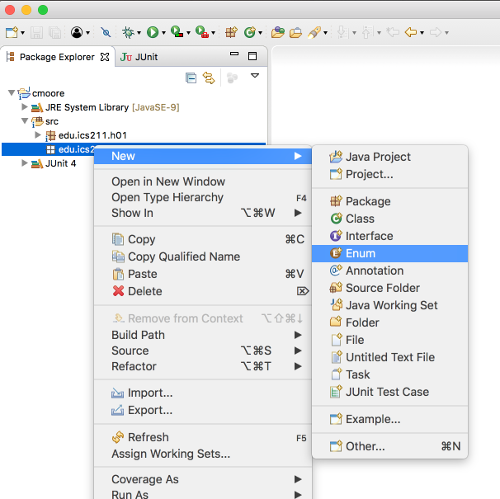
Name the Enum BeerType.
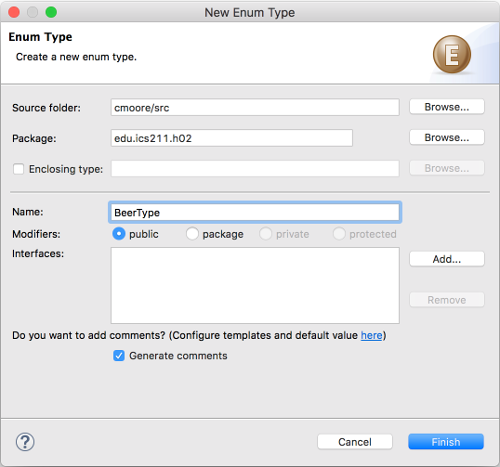
Then copy the contents of BeerType.java into the file.
3. Create the base abstract class Beer that implements Comparable<Beer>
Choose New -> Class.
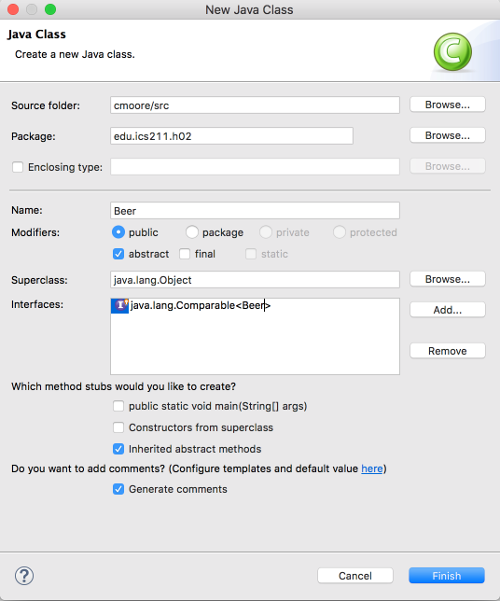
Make sure you add the Comparable<Beer> interface and click the abstract modifier before you click finish.
Here’s a screen shot of my Beer class the eclipse created. Notice the compareTo method was automatically created.
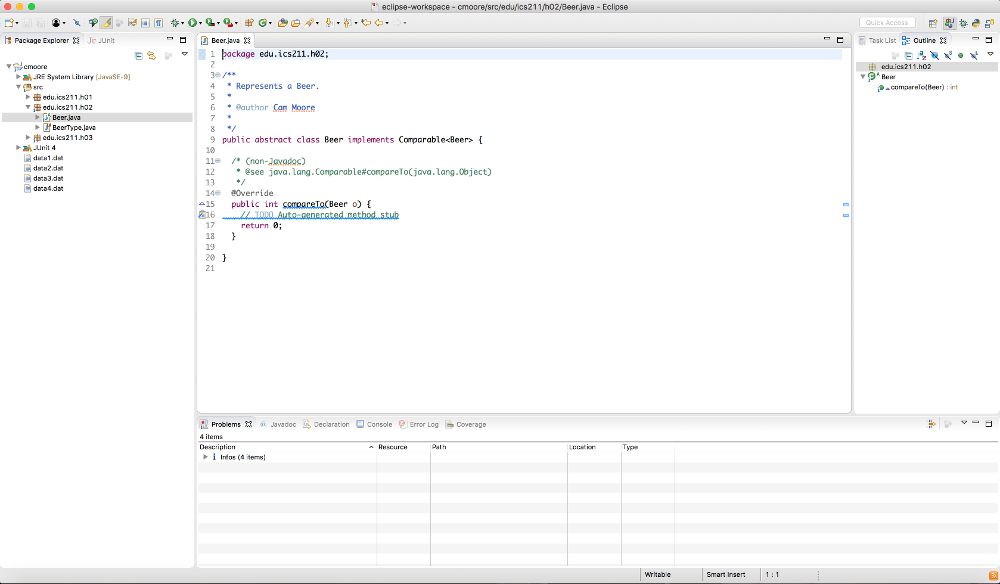
Modify the base abstract class Beer so that it has:
- A private String member variable called name.
- A private BeerType member variable called type.
- A protected Integer member variable called ibu.
- A protected Double member variable called abv.
- A constructor that takes a name and type.
- A constructor that takes a name, type, ibu and abv.
- The compareTo method should compare the beers’ name.
- There should be get methods for all the member variables.
- There should be one set method for changing the name of the beer.
The Beer class must be abstract. You cannot create an instance of a generic beer. You can only create instances of the subclasses which are concrete.
Here’s a screen shot of my Beer class in Eclipse.
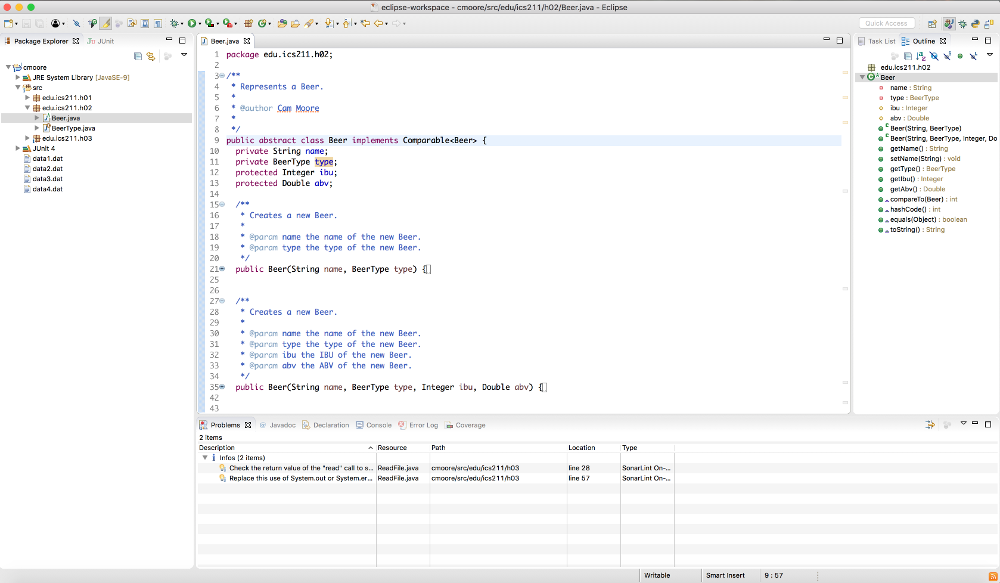
Notice I’ve added the getters and setters, hashCode, equals, toString methods and there are no Problems in my project. That means that there are no compile or checkstyle errors.
4. Create the class Pilsner that extends Beer
Class Pilsner extends Beer has:
- A constructor that sets the name, ibu and abv. Be sure to set the Pilsner’s type to BeerType.PILSNER. This constructor should check the ibu and abv making sure they are valid. If they aren’t throw an IllegalArgumentException.
-
A constructor that sets the name and chooses a random valid ibu and abv values.
- Pilsner ibu must be between 25 and 45.
- Pilsner abv must be between 4.2 and 6.0.
- A protected constructor that sets the name, type, ibu and abv. This constructor will be used by the BohemianPilsner subclasses to set the correct type of beer.
- A protected constructor that sets the name, type. This constructor will be used by the BohemianPilsner subclass to set the correct type of beer.
Once you are done, your Pilsner class should be able to pass these tests PilsnerTest. To check this save the PilsnerTest.java file in the same directory as your Pilsner.java file. The you can run the tests by opening the file and choosing Run -> Run As -> JUnit Test. You should see something like:
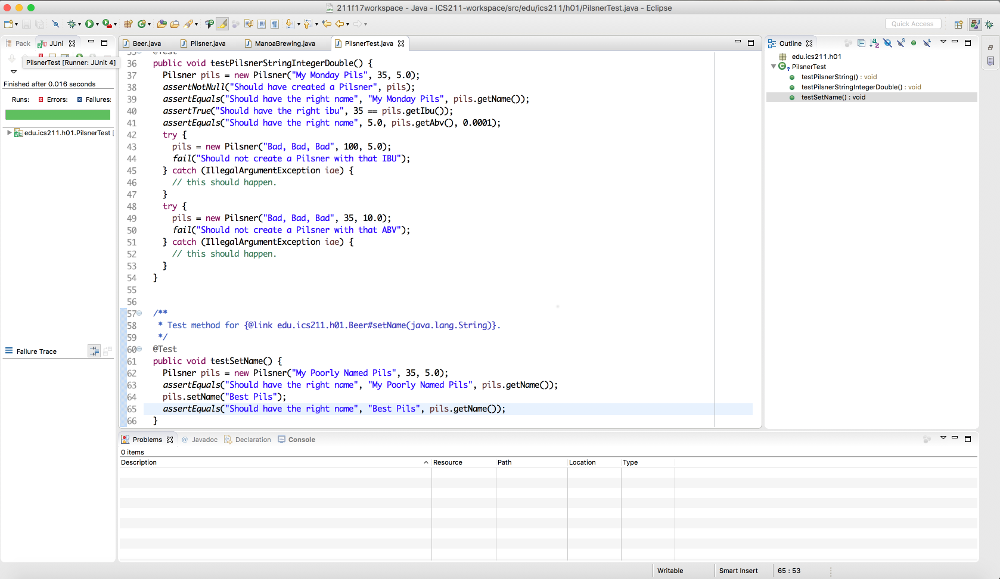
The green bar on the left indicates all JUnit tests passed.
5. Create two other Beer subclasses, BohemianPilsner and IndiaPaleAle
Class BohemianPilsner extends Pilsner,
- A constructor that sets the name, ibu and abv. This should check the ibu and abv making sure they are valid. If they aren’t throw an IllegalArgumentException.
-
A constructor that sets the name and chooses a random valid ibu and abv.
- BohemianPilsner ibu must be between 35 and 45.
- BohemianPilsner abv must be between 4.2 and 5.4.
Your BohemianPilsner class should pass BohemianPilsnerTests.
Class IndiaPaleAle extends Beer,
- A constructor that sets the name, ibu and abv. This should check the ibu and abv making sure they are valid. If they aren’t throw an IllegalArgumentException.
-
A constructor that sets the name and chooses a random valid ibu and abv.
- IndiaPaleAle ibu must be between 40 and 100.
- IndiaPaleAle abv must be between 5.0 and 10.0.
You should create JUnit tests for your IndiaPaleAle class.
6. Create the IBrewery interface
The IBrewery interface defines the methods all Breweries must implement. Choose New -> Interface.
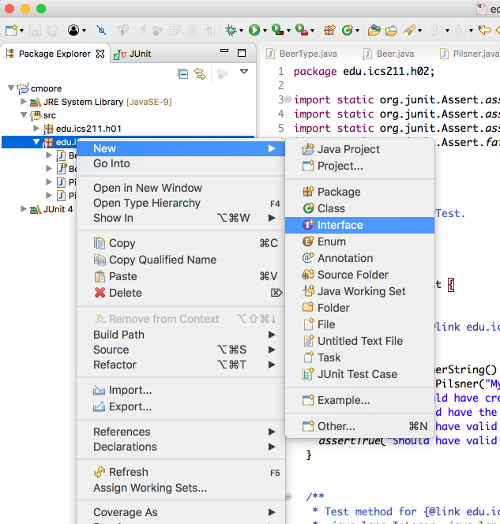
Name the interface IBrewery
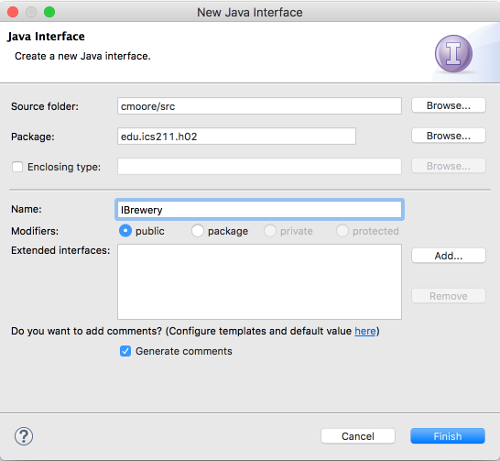
Copy the contents of IBrewery.java into the new interface.
7. Create the ManoaBrewing class
Create a ManoaBrewing singleton class that can create Pilsners, BohemianPilsners and IndiaPaleAles. Singleton classes have a static method getInstance() that returns the one and only one instance of the class. The class must implement the IBrewery interface.
Here’s a screen shot of my ManoaBrewing class.
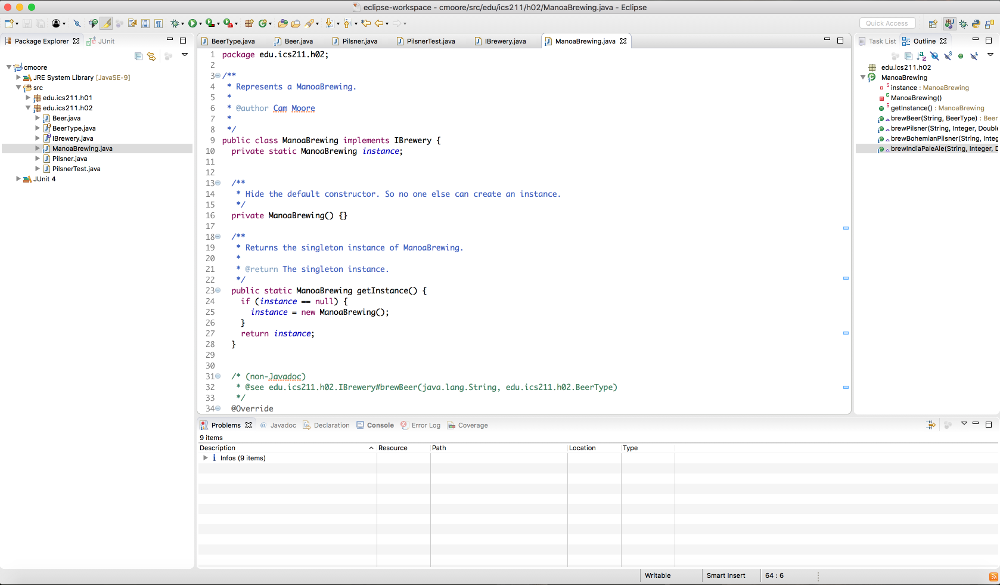
Notice there are no Problems in my project. That means that there are no compile or checkstyle errors.
Implement the IBrewery methods. The brewBeer method should check the BeerType then brew a random beer of that type. For the other brew methods if the ibu or abv are not correct the methods should throw an IllegalArgumentException.
At this point you can test your code with ManoaBrewingTest.java. We are going to use the JUnit tests to evaluate your homework for correctness.
8. (Optional) Create some Comparators
Next week’s homework is sorting a flight of beer (actually an array). You will need to create two comparators to do the sorting so you can get a head start on next week’s homework by:
-
Creating an IbuComparator that implements Comparator<Beer> deciding based upon the beers’ ibu values.
-
Creating an AbvComparator that implements Comparator<Beer> deciding based upon the beers’ abv values.
You can test your comparators using ComparatorTest.java.
Grading Rubric
| Criterion | Excellent (100%) | Satisfactory (75%) | Borderline (50%) | Unsatisfactory (25%) | Poor (0) |
|---|---|---|---|---|---|
| Adherence to standards - 2 points Does it conform to standards in every detail? |
No errors. | Minor details of the assignment are violated, or poor choices are made where the assignment is unclear. | Significant details of the assignment or the underlying program intent are violated, but the program still fulfills essential functions. | Significant details of the assignment or the underlying program intent are violated, but the program still fulfills some essential functions. | Misses the point of the assignment. |
| Breakdown (modular design) - 1 point Does it demonstrate good modular design? |
No errors. | 1-3 minor errors. | > 3 minor errors OR 1 major error. | 2 major errors | > 2 major error. |
| Correctness of code - 4 points Does it work? Does it pass JUnit? |
Passes all tests. | Works for typical input, may fail for minor special cases. | Fails for typical input, for a minor reason. | Fails for typical input, for a major reason. | No. |
| Documentation, and style - 2 points Is it clear and maintainable? Does it pass CheckStyle? |
No errors. | 1-3 minor errors. | > 3 minor errors OR 1 major error. | 2 major errors | > 2 major error. |
| Efficiency of code - 1 point Does it use the Java features well? |
No errors. | 1-3 minor errors. | > 3 minor errors OR 1 major error. | 2 major errors | > 2 major error. |
Turning in the Assignment
The assignment is due on Friday at 11:55pm. You may turn it in early.
- Does your code follow the Java Coding Standard and pass CheckStyle?
- Does your code pass the JUnit Tests?
-
Export your project by choosing File -> Export. Under General choose Archive File.
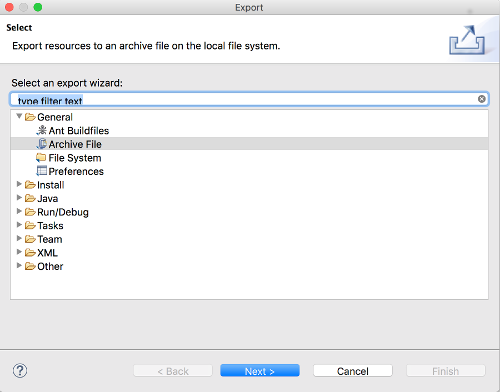
On the next dialog choose only the src files in your project. Make sure the .checkstyle, .classpath, and .project files are selected.
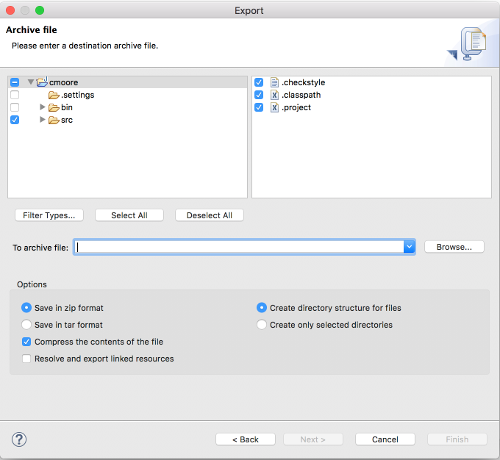
Name the zip file H02.
- Sign into Laulima, then navigate to the ICS211 site. In the left hand side of the site, there is an Assignments tab/link. Click on it and view all of the posted assignments. Select the assignment that you want to turn in and attach your H02.zip file and accept the honor pledge to submit the assignment. Yes, the pledge says you worked alone, but in ICS 211 you can work together as long as you give credit to you teammates. See the Giving Credit screen cast.